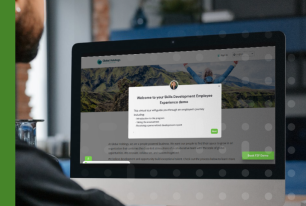Update Your Talent Management Strategy for Hybrid Work
Most talent management strategies were built for a different era, now is the time to get these ready for a hybrid world.
Share
Despite the challenges, the pandemic also presents a rare opportunity for leaders to rethink how they want to run their organizations. One significant change is the power shift from employers to employees, propelled by a lack of job satisfaction and work-life balance. A recent MIT study found individuals are 10.4x more likely to leave an organization owing to a toxic culture than compensation, making organizational culture a critical enabler. Furthermore, McKinsey research found employees are leaving organizations without having another job lined up when they experience uncaring leaders, unsustainable work hours or performance levels, a lack of meaningful work or focus on wellbeing, and feel having limited opportunities to learn and grow their careers.
The message from individuals is clear—we cannot go back to how things were. We need to move forward to empathy-led workplaces, with meaningful work, growth opportunities, and flexible cultures to get the balance right.
Start with really understanding people
We have heard many times before, “always start with your people”. But how often has this been genuinely delivered in practice? Organizations have learned that we must find ways to sustain, and because of this, are now prioritizing resilience as much as efficiency. The pandemic served to exacerbate gaps between groups and organizations must also take steps to ensure our experiences do not reverse the progress made in building more equal, empathy-led, and inclusive cultures.
Companies can get ahead of this by building their talent data to enable fair and dynamic aligning of individuals with the opportunity. This will help provide individuals with access to tools to better understand themselves—their strengths and areas of development—as well as to help fuel self-driven learning and career progression. To enable this progress, there is no better way other than to start with objectively understanding your people as individuals.
Talent management in a hybrid world
For those focused on talent management, here are some key things to consider:
1. New world of work = new organizational capabilities
Hybrid, remote, in-person, and digitized ways of working have led to the acceleration in the importance of behavioral skills such as communication, collaboration, empathy, and building connections, as well as technical capabilities. The frameworks most organizations had in place pre-pandemic had a different emphasis so there is an urgent need for companies to review their underlying capability frameworks to ensure they are focused on the aspects required for success in a hybrid world.
2. Everyone has potential
We face a risk in organizations that the gaps between groups created by the need to survive throughout the pandemic will exacerbate skills gaps and unravel the progress made in Diversity, Equity, and Inclusion. However, those working in talent management and leadership roles have the opportunity to address this risk through embedding fair, transparent, and inclusive talent practices across companies.
As roles, teams, and functions evolve every day and priorities constantly shift, being able to re-skill and take on different and emerging roles is fast becoming a core requirement. Building talent programs that enable objective identification of potential and democratize development opportunities at scale, as opposed to exclusive, top-talent-only focused programs, will provide a solid step in the right direction.
We have heard many times before, “always start with your people”. But how often has this been genuinely delivered in practice?
3. A new era in people-led leadership
Just as core organizational capabilities change, so too are the ingredients for management and leadership success. In highly networked and distributed environments and disruptive and ambiguous contexts, managers and leaders can no longer rely on transactional, top-down approaches. Rather, organizations need to find people-focused leaders who are emotionally intelligent, show empathy, empower others, and can demonstrate future focus and resilience to drive constant transformation. This requires a shift in the identification, development, and promotion of these critical roles and the talent initiatives enabling them.
4. Invest in real-time data and objective understanding of people
As Gartner identified, we are now entering an era of employee data. Just as customer data revolutionized retailers, employee data is on the path to doing the same for HR and organizations. This is a direction companies simply must embrace to build engaged, productive, inclusive, and sustainable businesses people want to work for. Technology is a key enabler, as are skills in people analytics, AI, and workforce planning. It starts with building objective assessment into core talent processes and harnessing this data and combining it with broader employee data to enable live and predictive people insight.
The changes accelerated by the pandemic show organizations and leaders that individuals want more than just monetary benefits. They want purposeful work, empowerment, and cultures that support their professional and personal development. To achieve this, you need to have a shift in mindset, revisit your talent management strategy, and be equipped with the right tools to manage talent within your organization in this hybrid world. Make sure you are ready.
For more insights into how you can shape happy and healthy hybrid workplaces where talent flourishes, download our latest insight report.









